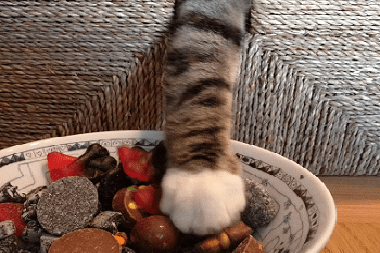Diseases of pets >>>> Sweets for animals
Sweets for animals.

Sweets and pets are incompatible things if you want to keep your pet healthy. But almost all pets never give up a piece of candy or sugar. Therefore, all responsibility for the prevention of diabetes mellitus falls on the shoulders of the owner, whether he can resist the pleading gaze of his pet, begging for something sweet.
A short excursion into the physiology of pets:
In dogs, cats and rodents, there is a deficiency in the production of insulin, which means that they have nothing to break down glucose, so any product containing glucose will lead to the development of diabetes mellitus and the imminent death of the animal.
To avoid dangerous disorders in the pet's health:
- It is necessary to carefully check the composition of the feed, which should not contain ingredients such as sugar, molasses, honey or syrup, even in minimal quantities.
- Do not offer your pets as a treat fruits with a high sugar content (pears, sweet apples, peaches, melons, apricots, etc.).
- Do not spoil your pet with chocolates, marmalade, marshmallows, dried fruits, cakes, cakes, sweet cookies, sweet cream, sweet cereals, sugar.
- Make sure that your pet does not get to your supplies of sweets on its own.
- Do not leave leftover sweets, sweets, cakes, or other foods containing glucose in the food waste buckets.
- Do not feed pets with sugary yogurt or ice cream.
As entertainment and delicacies, it is better to offer the animal a piece of cheese, cheese biscuits, nuts without glaze, a piece of boiled fish or chicken, a boiled head of Brussels sprouts or broccoli inflorescence, boiled carrots.
There are certain types of food (VIP) that can be given not every day, but used as holiday meals or treats. For example, feed from expensive fish, meat or seafood.

Read

Read



























